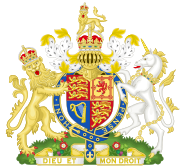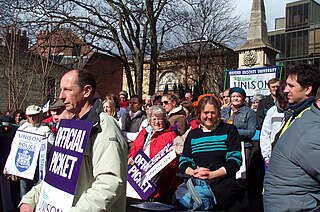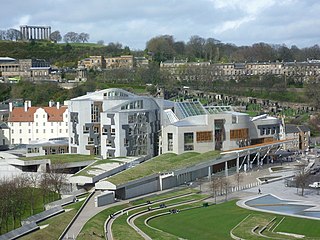| Paul v NALGO | |
|---|---|
 | |
| Court | High Court of Justice |
| Citation(s) | [1987] IRLR 413 |
| Keywords | |
| Trade union, governance | |
Paul v NALGO [1987] IRLR 413 is a UK labour law case, concerning the governance of trade unions in the United Kingdom.
| Paul v NALGO | |
|---|---|
 | |
| Court | High Court of Justice |
| Citation(s) | [1987] IRLR 413 |
| Keywords | |
| Trade union, governance | |
Paul v NALGO [1987] IRLR 413 is a UK labour law case, concerning the governance of trade unions in the United Kingdom.
P and F, members of NALGO, claimed the union's publications against the Tories were unlawful under Trade Union Act 1913, section 3(3)(f) providing funds could not be used to persuade people to not vote for a candidate – unless there had been a political objects clause, under what is now Trade Union and Labour Relations (Consolidation) Act 1992, section 72(1)(f).
Sir Nicolas Browne-Wilkinson VC held the literature was unlawful under the TUA 1913 s 3(3)(f) as its main purpose was to persuade people to not vote Tory, and so was unlawful.
Labour laws are those that mediate the relationship between workers, employing entities, trade unions, and the government. Collective labour law relates to the tripartite relationship between employee, employer, and union.

United Kingdom labour law regulates the relations between workers, employers and trade unions. People at work in the UK can rely upon a minimum set of employment rights, which are found in Acts of Parliament, Regulations, common law and equity. This includes the right to a minimum wage of £9.50 for over-23-year-olds from April 2022 under the National Minimum Wage Act 1998. The Working Time Regulations 1998 give the right to 28 days paid holidays, breaks from work, and attempt to limit long working hours. The Employment Rights Act 1996 gives the right to leave for child care, and the right to request flexible working patterns. The Pensions Act 2008 gives the right to be automatically enrolled in a basic occupational pension, whose funds must be protected according to the Pensions Act 1995.

Picketing is a form of protest in which people congregate outside a place of work or location where an event is taking place. Often, this is done in an attempt to dissuade others from going in, but it can also be done to draw public attention to a cause. Picketers normally endeavor to be non-violent. It can have a number of aims, but is generally to put pressure on the party targeted to meet particular demands or cease operations. This pressure is achieved by harming the business through loss of customers and negative publicity, or by discouraging or preventing workers or customers from entering the site and thereby preventing the business from operating normally.

Human rights in the United Kingdom concern the fundamental rights in law of every person in the United Kingdom. An integral part of the UK constitution, human rights derive from common law, from statutes such as Magna Carta, the Bill of Rights 1689 and the Human Rights Act 1998, from membership of the Council of Europe, and from international law.
Amalgamated Society of Railway Servants v Osborne [1910] AC 87 is a UK labour law case, which ruled that it was unlawful for trade unions to use funds raised from their subscriptions for political purposes.

Trade unions in the United Kingdom were first decriminalised under the recommendation of a Royal commission in 1867, which agreed that the establishment of the organisations was to the advantage of both employers and employees. Legalised in 1871, the Trade Union Movement sought to reform socio-economic conditions for working men in British industries, and the trade unions' search for this led to the creation of a Labour Representation Committee which effectively formed the basis for today's Labour Party, which still has extensive links with the Trade Union Movement in Britain. Margaret Thatcher's governments weakened the powers of the unions in the 1980s, in particular by making it more difficult to strike legally, and some within the British trades union movement criticised Tony Blair's Labour government for not reversing some of Thatcher's changes. Most British unions are members of the TUC, the Trades Union Congress, or where appropriate, the Scottish Trades Union Congress or the Irish Congress of Trade Unions, which are the country's principal national trade union centres.

The Trade Union and Labour Relations (Consolidation) Act 1992 is a UK Act of Parliament which regulates United Kingdom labour law. The Act applies in full in England and Wales and in Scotland, and partially in Northern Ireland.

The Employment Act 1982 is an Act of the Parliament of the United Kingdom, mainly relating to trade unions. It increased compensation for those dismissed because of the closed shop and restricted the immunities enjoyed by trade unions.
United Kingdom employment equality law is a body of law which legislates against prejudice-based actions in the workplace. As an integral part of UK labour law it is unlawful to discriminate against a person because they have one of the "protected characteristics", which are, age, disability, gender reassignment, marriage and civil partnership, race, religion or belief, sex, pregnancy and maternity, and sexual orientation. The primary legislation is the Equality Act 2010, which outlaws discrimination in access to education, public services, private goods and services, transport or premises in addition to employment. This follows three major European Union Directives, and is supplement by other Acts like the Protection from Harassment Act 1997. Furthermore, discrimination on the grounds of work status, as a part-time worker, fixed term employee, agency worker or union membership is banned as a result of a combination of statutory instruments and the Trade Union and Labour Relations (Consolidation) Act 1992, again following European law. Disputes are typically resolved in the workplace in consultation with an employer or trade union, or with advice from a solicitor, ACAS or the Citizens Advice Bureau a claim may be brought in an employment tribunal. The Equality Act 2006 established the Equality and Human Rights Commission, a body designed to strengthen enforcement of equality laws.

The Trade Disputes and Trade Unions Act 1927 was a British Act of Parliament passed in response to the General Strike of 1926, introduced by the Attorney General for England and Wales, Sir Douglas Hogg MP.

The Trade Union Act 1871 was an Act of the Parliament of the United Kingdom which legalised trade unions for the first time in the United Kingdom. This was one of the founding pieces of legislation in UK labour law, though it has today been superseded by the Trade Union and Labour Relations (Consolidation) Act 1992.

Devolution is the process in which the central British parliament grants administrative powers to the devolved Scottish Parliament. Prior to the advent of devolution, some had argued for a Scottish Parliament within the United Kingdom – while others have since advocated for complete independence. The people of Scotland first got the opportunity to vote in a referendum on proposals for devolution in 1979 and, although a majority of those voting voted 'Yes', the referendum legislation also required 40% of the electorate to vote 'Yes' for the plans to be enacted and this was not achieved. A second referendum opportunity in 1997, this time on a strong proposal, resulted in an overwhelming 'Yes' victory, leading to the Scotland Act 1998 being passed and the Scottish Parliament being established in 1999.

The constitution of the United Kingdom or British constitution comprises the written and unwritten arrangements that establish the United Kingdom of Great Britain and Northern Ireland as a political body. Unlike in most countries, no attempt has been made to codify such arrangements into a single document, thus it is known as an uncodified constitution. This enables the constitution to be easily changed as no provisions are formally entrenched; the Supreme Court of the United Kingdom recognises that there are constitutional principles, including parliamentary sovereignty, the rule of law, democracy, and upholding international law.
Collective action in the United Kingdom including the right to strike in UK labour law is the main support for collective bargaining. Although the right to strike has attained the status, since 1906, of a fundamental human right, protected in domestic case law, statute, the European Convention on Human Rights and international law, the rules in statute have generated significant litigation. The "right of workers to engage in a strike or other industrial action" is expressly recognised in the Trade Union and Labour Relations (Consolidation) Act 1992 section 180, and has been recognised repeatedly by the Court of Appeal as "a fundamental human right"., and the House of Lords.
The South Lanarkshire by-election was a Parliamentary by-election held on 12 December 1913. The constituency returned one Member of Parliament (MP) to the House of Commons of the United Kingdom, elected by the first past the post voting system.
Esterman v NALGO [1974] ICR 625 is a UK labour law case, concerning trade union regulation.
The Liverpool City Council adopted policies largely inspired by those elected Councillors who were members of a left wing group known as the Militant tendency through much of the 1980s, and was subsequently taken to court by the Government of Margaret Thatcher.

The Trade Union Act 2016 is an Act of Parliament that amended the Trade Union and Labour Relations (Consolidation) Act 1992. It forms part of the UK's labour law. Passed during the second Cameron ministry, it was fiercely opposed by all UK trade unions. Alan Bogg, professor of labour law at the University of Oxford, described the act as authoritarian.

The European Union Act 2020 is an Act of the Parliament of the United Kingdom that implements the EU–UK Trade and Cooperation Agreement agreed between the United Kingdom and the European Union and Euratom in December 2020. The bill for the Act was introduced to the House of Commons by Chancellor of the Duchy of Lancaster Michael Gove on 30 December 2020, with the aim of enacting the bill on the same day.

The Conduct of Employment Agencies and Employment Businesses (Amendment) Regulations 2022 is a statutory instrument of the Parliament of the United Kingdom. The regulations removed Regulation 7 of the Conduct of Employment Agencies and Employment Businesses Regulations 2003, which prevented employment agencies from supplying agency workers to employers to replace workers taking part in official industrial action. The regulations were struck down in a High Court case in July 2023, and will be quashed from 10 August 2023.